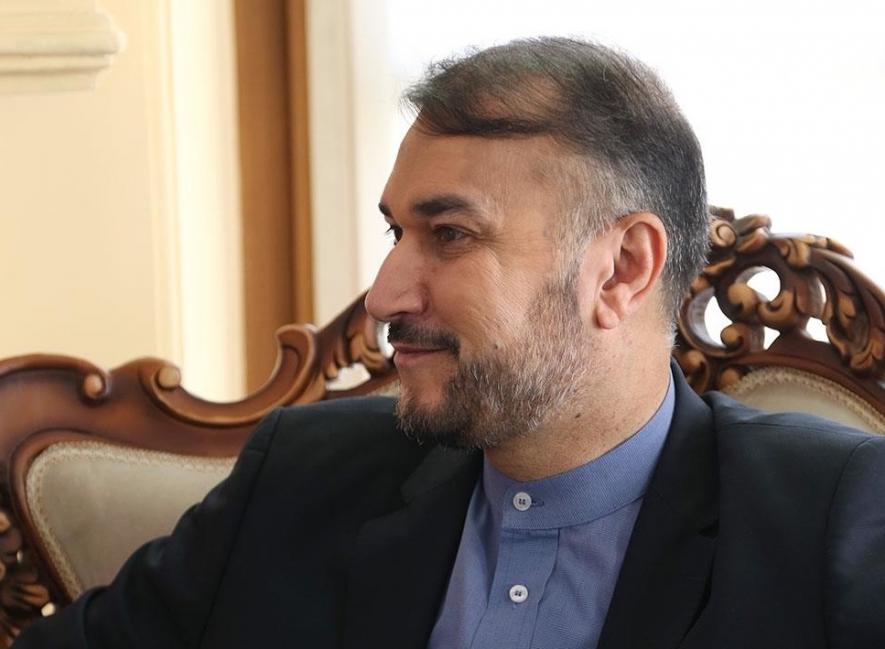US Sanctions: ‘70% of it is Psychological Warfare, Just 30% is Hitting Iran’

The President of United States, Donald Trump, who imposed “tough” sanctions on Iran in November in order to make it “behave” vis-a -vis its nuclear and missiles programme, is said to have business interests in several American companies that deal with Iran by proxy through other countries. While former US President George W Bush had interests in the oil and gas sector, Trump’s business interests are said to be wider. So, will Trump not like sanctions to be implemented hard and fast to save his business interests? Newsclick spoke to Dr Hossein Amirabdollahian, special assistant on international affairs to the Speaker of the Islamic Parliament of Iran (Majlis), on this as well as on Iran’s role in the ongoing civil wars in Syria. Edited Excerpts:
Q: How is Iran coping with the US sanctions and what has been the impact on your economy?
A: Seventy per cent of the sanctions is psychological warfare, only 30% of it is actually hitting Iran. If we conquer the first, the second is nothing for us. Despite sanctions, the US has entered the Iranian market through different channels.
Iran has a dollar reserves of 20 billion in its central bank. And around $8-10 billion is held in Iranian households.
We used to export 7-8 billion barrels of oil every day, which has now gone down to less than 2 million barrels as a result of sanctions. We export it to South Korea, Japan and India. Iran produces 99% of medicines that it requires, but still we have to depend on other countries for the rest 1%. And we face difficulties in buying those medicines from other nations because there are no swift banking services.
Trump himself wants to break sanctions against Iran, and the companies associated with him want to establish trade relations with Iran.
What is the impact of sanctions on your currency?
Saudi Arabia and the United Arab Emirates are keeping a close eye on the Iranian market. They are spreading a propaganda that our currency is getting devalued, which is not true. Day-by-day, the rate of the US dollar is coming down.
Sanctions, in a way, have become a boon for us, instead of a curse. We are self-dependent. We have developed our infrastructure and workforce. We are improving indigenous technologies.
What is the status of your business with the European Union (EU) countries? Several of them had said they would defy US? Are they doing something concrete or was it a mere lip service?
They had said so, but we are getting a lukewarm response. When most of the countries are looking towards the West, Europe and America, we are strengthening our ties with our neighbours. The time has now come to know each other. During sanctions, India and Iran have come closer. India’s investment here will strengthen its position in South Asia.
What about your support to civil wars in Syria and Yemen?
Around seven lakh civilians have been killed in Syria. It is an extremely violent civil war. As a participant in the conflict, Iran has been entangled in a very complex situation.
At present, the US and Saudi told Bashar al-Assad (Syrian President) that if he threw out Iranian militias out of Syria, they would recognise his government.
Initially, when this conflict started, Iran was not a part of it. Iran became a part only when terrorists began participating in it and the US government lent them against the Assad government. They imposed sanctions worth billion of dollars on Syria.
For Iran, its own security and the security of its allies in the region is paramount. That is why Iran is supporting Syria. To work against Iran, the US has distributed jobs among its allies in the region, like it is providing logistics to the Saudi alliance in Yemen. Saudi and UAE players have also entered the Iranian market to destabilise it.
I recently visited a Persian Gulf country for talks on the Syrian crisis. When I was coming out of my hotel lift, I saw an ISIS leader emerging out from another lift. This shows how regional countries are fomenting the Syrian crisis.
What, according to you, could be the resolution of the Kashmir issue in India?
We should remember that our common enemies are trying to foster discord among people by not letting us resolve our mutual issues. They want to keep the crisis boiling. There are around 10 Kashmiris (Kashmir-like disputes) in the West Asian regions. For instance, UAE-Saudi, Kuwait-Saudi and Oman-Saudi border disputes.
The best option (to resolve the Kashmir issue) would be bilateral solutions between India and Pakistan. India should not involve any outsider.
How are your relations with Turkey, given the fact that it opposes your role in Syria?
We have good relations with Turkey. On the issue of Syria, we have different approaches.
(The writer was in Iran on a visit hosted by the Iranian Cultural Centre in Delhi.)
Get the latest reports & analysis with people's perspective on Protests, movements & deep analytical videos, discussions of the current affairs in your Telegram app. Subscribe to NewsClick's Telegram channel & get Real-Time updates on stories, as they get published on our website.
























